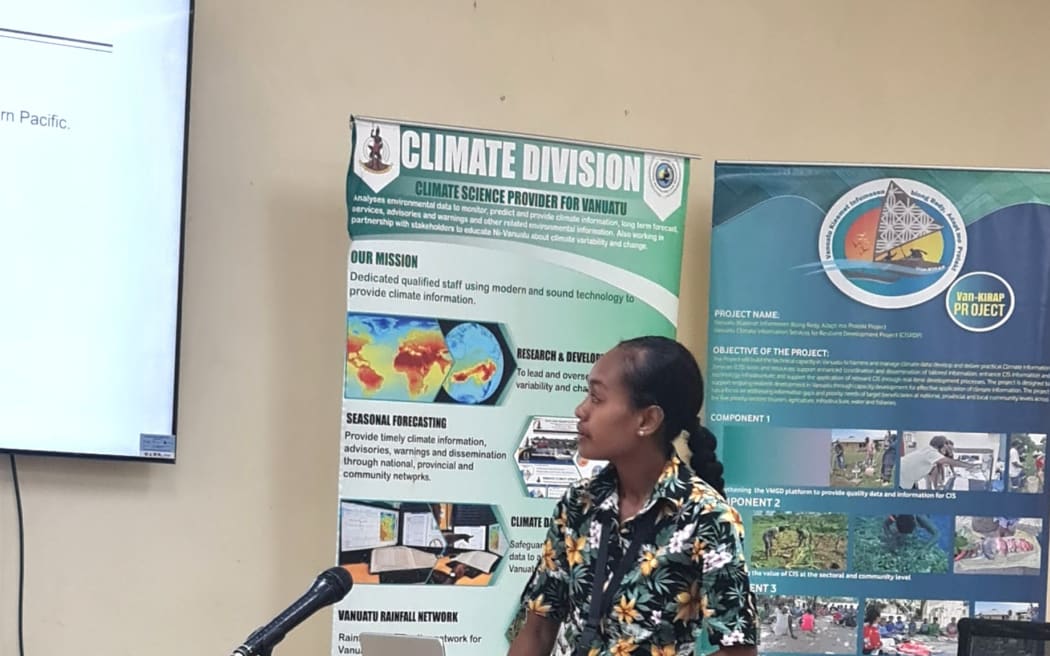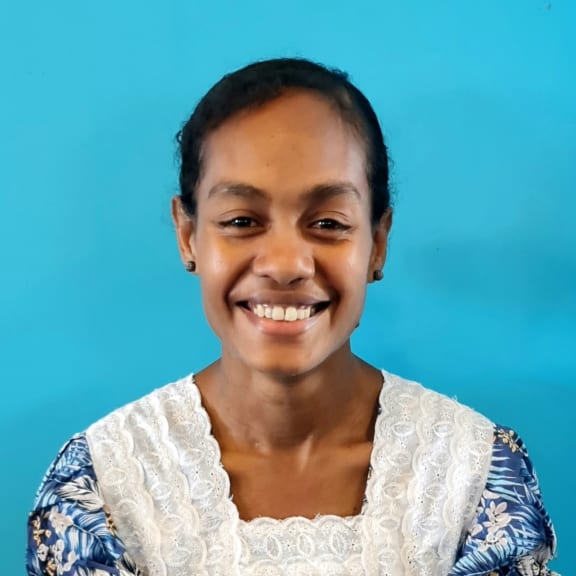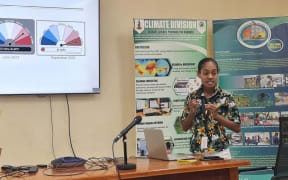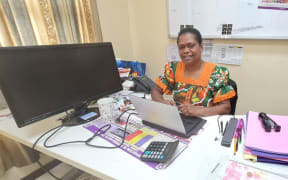By RNZ Pacific/Van-KIRAP/SPREP

Glenda Pakoa during a press conference declaring an El Nino event for Vanuatu Photo: RNZ Pacific/Moera Tuilaepa-Taylor
When the Met Service spoke everyone in Vanuatu listened, principal science officer at the Vanuatu Meteorology and Geo-Hazard Department (VMGD) Glenda Pakoa says.
Pakoa has been the principal scientific officer in the VMGD's climate division since 2021. She spoke to RNZ Pacific about her role, which she described as collecting and presenting climate information for Vanuatu.
This includes monitoring El Nino conditions.
"We monitor El Nino southern oscillation or most of us may be familiar with the three phases of the El Nino Southern Oscillation which are El Nino, La Nina and Neutral."
Pakoa uses international climate models, which are then downscaled to suit Vanuatu's conditions. She uses these models to provide useful information to stakeholding sectors such as tourism, fisheries, infrastructure and agriculture.
"This information includes analysis and predictions around the number of cyclones in an upcoming cyclone season, as well as projections for a 3 to 6 month period for rainfall levels, temperature, sea level and sea surface temperature."
Pakoa also spoke about what made her embark on a career in meteorology and climate science. Even while growing up, she was aware that during a cyclone, everyone in Vanuatu depends on vital information from the Met Service.
She recalls an early experience with a cyclone: "When I was in class, I was 4 or 5 and we had this category 3 cyclone that came into the Vanuatu area of responsibility.
"And then all the power went out and then we only had this radio, where it uses batteries, and the only source of information that we relied on was the radio.
"And when the Met Service spoke, everyone throughout Vanuatu listens, and that's when it captured my interest that one day."

Photo: RNZ Pacific/Moera Tuilaepa-Taylor
Pakoa also had some advice for young women who were considering a career in the meteorological service.
"To any young girls out there who want to follow the same career path, my advice is to work hard. To work for the met service you need a scientific background, so if you are still in school studying, I would encourage you to take your studies seriously, prioritise your programmes in school, persevere, no matter what challenge you face, and then when it comes to the workforce, it's another thing."
Pakoa started at the VMGD as a student and became an unpaid intern. She believes the experience of working in that environment was more valuable than money.
"I happily stayed and did the job because no one else was available to do the job and I didn't expect any pay at that time. My main goal at that time was to give services to Vanuatu but in return, I gained a lot of experience in the workforce in this professional career as well.
Pakoa believes that the secret to success is to give your best, and expect nothing in return.
"Carry out whatever task you are given without expecting anything in return and to work as hard as you can, build yourself because experience and knowledge are more important than money.
"So what I gained out from this is that my department gained confidence and trust in me.
"Don't do anything expecting incentives or money - do it with all your heart and one day you will be rewarded in a way that you don't expect. A good reputation is better than a lot of money."
Pakoa knows that in her industry trust and confidence are essential. She is occasionally called to stand in for the Met Service director at regional meetings, and knows this is only possible because of the trust and confidence she has earned.
She encourages everyone to work on their dreams. "If you are struggling right now, don't give up."



